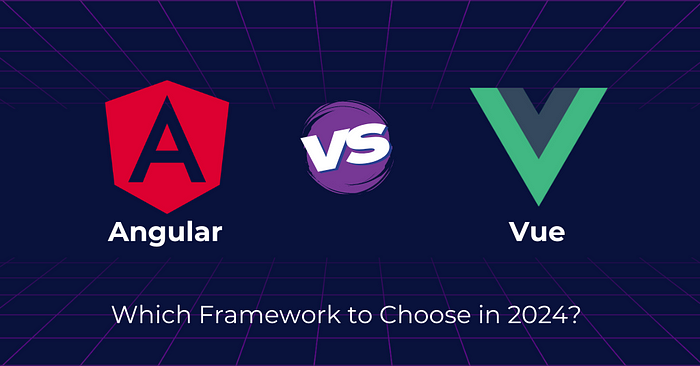Angular vs Vue: Which Framework to Choose in 2024?
Choosing between Angular and Vue in 2024 depends on various factors, including project requirements, team expertise, and long-term maintenance considerations.

Overview of Angular
Angular developed and maintained by Google, is a comprehensive framework for building dynamic web applications. It provides a full featured platform with a strong opinion on how applications should be structured.
Angular known for its:
Typescript Integration: Angular is built with typescript, provides static typing and advanced refactoring capabilities.
Component-Based architecture: Encourages modularity and reusability of components.
Two-way Data Binding: Synchronizes data between model and the view, simplifying the development process.
Dependency Injections: Promote better code organization and testability.
Extensive Ecosystem: Rich set of tools, libraries, and a strong community.
Overview of Vue
Vue created by Evan You, is a progressive JavaScript framework that focuses on the view layer. It is designed to be incrementally adaptable and flexible, making it suitable for various project sizes. Key features of Vue included.
Easy of Learning: Vue’s gentle learning curve makes it accessible to beginners.
Reactive Data Binding: Provide an intuitive way to manage the application state.
Single File Components: Encapsulates HTML, CSS, and JavaScript in a single file promoting better organization.
Flexibility: Can be used for building Single Page Applications(SPAs) as well as integrating into existing projects
Growing Ecosystem: A rich collection of tools and libraries, including Vue Router and Vuex for state management.
1) Performance
Angular:
Its performance is optimized through Ahead-of-Time (AOT) compilation, which pre-complies the application code. This can lead to faster load times and better performance.
Vue:
Known for its lightweight nature and faster initial load times. Vue’s performance is optimized through its virtual DOM implementation, which efficiently updates the view when the data changes.
2) Development Experience
Angular:
Offers a complete development environment with tools like Angular CLI, which provides scaffolding, testing, and build optimization.
Vue:
Prioritizes simplicity and ease of use, making it ideal for quick prototyping and smaller projects. Vue CLI provides a seamless development experience with plugins and presets.
3) Scalability
Angular:
Designed for larger applications, Angular’s architecture supports complex, enterprise-level projects.
Vue:
While Vue can handle large applications, it is particularly well-suited for smaller to medium-sized projects.
4) Learning Curve
Angular:
Has a steeper learning curve due to its complexity and extensive feature set. Mastery of TypeScript is essential and understanding angular’s many concepts can be time-consuming.
Vue:
Known for its gentle learning curve, Vue is easier for beginners to pick up. Its simplicity and clear documentation make it accessible for developers with various levels of experience.
5) Use cases:
Angular:
Ideal for enterprise-level applications, larger-scale SPAs and projects that require robust architecture and maintainability.
Vue:
Suitable for small and medium-sized projects, rapid prototyping, and applications where ease of integration and flexibility are priorities.
Conclusion:
Both frameworks are powerful and have their own strengths. Evaluating your project requirements, team expertise, and long-term maintenance goals will help you make the best decision regarding web application development services.
